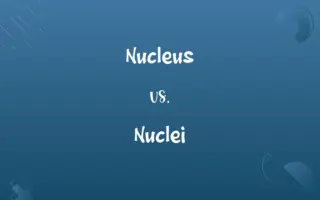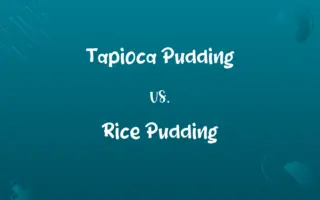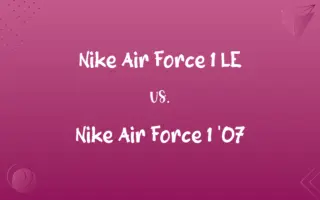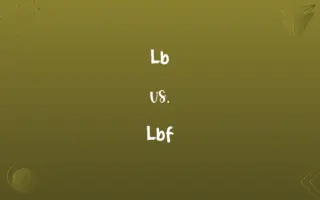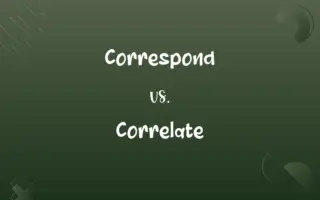Concrete vs. Discrete: Know the Difference

By Shumaila Saeed & Dua Fatima || Updated on March 5, 2024
Concrete concepts are tangible, perceived through senses, while discrete entities are distinct, separate, and countable, emphasizing difference in abstractness and countability.
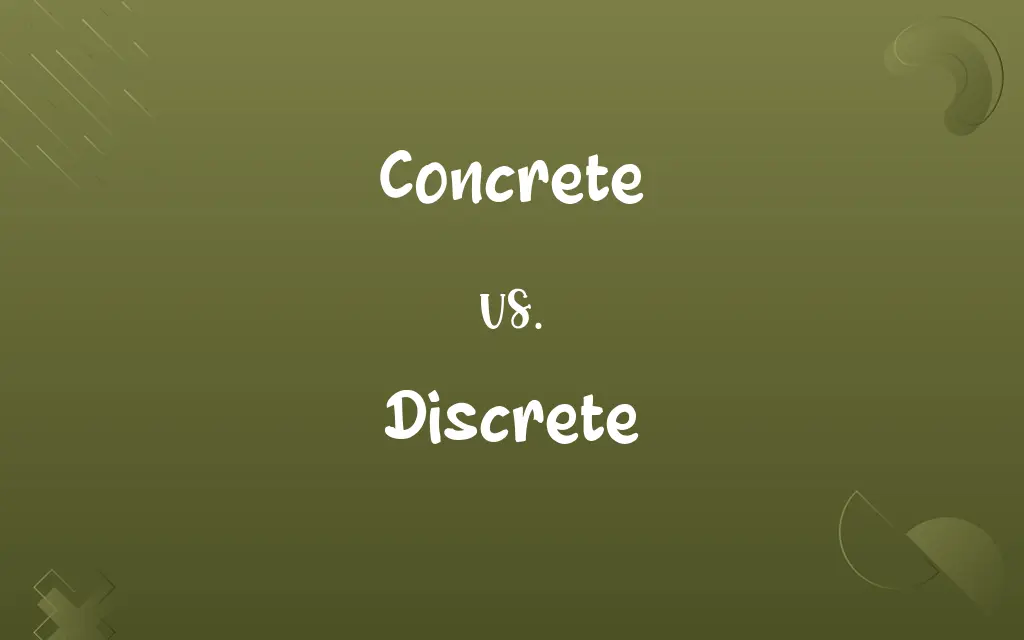
Key Differences
Concrete concepts refer to physical objects or phenomena that can be observed and measured directly through the senses. These include items like trees, buildings, or sounds, which exist in the real world and can be directly experienced. On the other hand, discrete entities are characterized by their distinctness and separateness, often used in mathematics and computing to describe countable, non-overlapping items or categories.
Shumaila Saeed
Mar 05, 2024
While concrete concepts are rooted in tangible experiences, providing a direct link to the physical world, discrete entities are defined by clear boundaries or distinctions that make them individually recognizable and countable. This distinction emphasizes the sensory-based nature of concrete concepts versus the abstract, often quantifiable nature of discrete entities.
Dua Fatima
Mar 05, 2024
The understanding of concrete concepts is often foundational, as it relies on direct sensory experience and perception, making it accessible from a young age. Conversely, the grasp of discrete concepts usually requires a level of abstract thinking, as it involves recognizing and categorizing entities based on specific characteristics that distinguish them from one another.
Shumaila Saeed
Mar 05, 2024
In education, concrete concepts are typically introduced before discrete concepts to build a base of understanding through tangible experiences. This approach leverages the natural human capacity to perceive and interact with the physical world before transitioning to more abstract, categorical thinking involved in understanding discrete entities.
Shumaila Saeed
Mar 05, 2024
Both concrete and discrete concepts play crucial roles in learning and cognition. Concrete concepts ground our understanding of the world in physical reality, while discrete concepts allow us to organize and categorize the world in ways that facilitate communication, analysis, and complex thought.
Hifza Nasir
Mar 05, 2024
ADVERTISEMENT
Comparison Chart
Nature
Tangible, can be perceived through the senses.
Distinct, countable, and separate.
Dua Fatima
Mar 05, 2024
Usage
Used to describe physical objects and phenomena.
Used in abstract contexts like mathematics and logic.
Shumaila Saeed
Mar 05, 2024
Accessibility
Directly accessible through sensory experience.
Requires abstract thinking to understand.
Dua Fatima
Mar 05, 2024
Role in Learning
Builds foundational understanding.
Facilitates complex thought and categorization.
Hifza Nasir
Mar 05, 2024
ADVERTISEMENT
Concrete and Discrete Definitions
Concrete
Pertaining to physical objects or phenomena that are directly perceivable.
The concrete texture of the brick was rough under his fingers.
Dua Fatima
Mar 05, 2024
Discrete
Consisting of separate or distinct parts.
The survey responses were categorized into discrete groups.
Dua Fatima
Mar 05, 2024
Concrete
Involving actual physical presence or form.
Art classes often focus on drawing concrete subjects like landscapes or portraits.
Dua Fatima
Mar 05, 2024
Discrete
Used to describe countable, individual elements or entities.
Digital images are made up of discrete pixels.
Shumaila Saeed
Mar 05, 2024
Concrete
Based on the real, physical world.
Science often requires concrete evidence for theories.
Hifza Nasir
Mar 05, 2024
ADVERTISEMENT
Discrete
Involving entities that are individually separate and distinct.
Discrete components in electronics perform specific functions.
Dua Fatima
Mar 05, 2024
Concrete
Relating to real, tangible experiences or entities.
Concrete examples help students grasp complex theories.
Shumaila Saeed
Mar 05, 2024
Discrete
Clearly separate, not continuous.
Mathematics deals with discrete values like integers.
Shumaila Saeed
Mar 05, 2024
Concrete
Grounded in material reality, as opposed to abstract concepts.
Children first learn through concrete sensory experiences.
Shumaila Saeed
Mar 05, 2024
Discrete
Pertaining to non-overlapping, distinguishable categories.
The programmer divided the data into discrete segments for analysis.
Shumaila Saeed
Mar 05, 2024
Concrete
Of or relating to an actual, specific thing or instance; particular
Had the concrete evidence needed to convict.
Shumaila Saeed
Oct 19, 2023
Discrete
Constituting a separate thing
Computers treat time as a series of discrete moments rather than a continuous flow.
Shumaila Saeed
Oct 19, 2023
Concrete
Relating to nouns, such as flower or rain, that denote a material or tangible object or phenomenon.
Shumaila Saeed
Oct 19, 2023
Discrete
Consisting of unconnected distinct parts
Society viewed as a discrete whole of individual agents.
Shumaila Saeed
Oct 19, 2023
Concrete
Existing in reality or in real experience; perceptible by the senses; real
Concrete objects such as trees.
Shumaila Saeed
Oct 19, 2023
Discrete
Separate; distinct; individual; non-continuous.
A government with three discrete divisions
Shumaila Saeed
Oct 19, 2023
Concrete
Formed by the coalescence of separate particles or parts into one mass; solid.
Shumaila Saeed
Oct 19, 2023
Discrete
That can be perceived individually, not as connected to, or part of, something else.
Shumaila Saeed
Oct 19, 2023
Discrete
Disjunctive; containing a disjunctive or discretive clause; as, "I resign my life, but not my honor," is a discrete proposition.
Shumaila Saeed
Oct 19, 2023
Concrete
A hard, strong construction material consisting of sand, conglomerate gravel, pebbles, broken stone, or slag in a mortar or cement matrix.
Shumaila Saeed
Oct 19, 2023
Concrete
To build, treat, or cover with hard, strong conglomerate construction material.
Shumaila Saeed
Oct 19, 2023
Discrete
Constituting a separate entity or part;
A government with three discrete divisions
On two distinct occasions
Shumaila Saeed
Oct 19, 2023
Concrete
Being or applying to actual things, not abstract qualities or categories.
Shumaila Saeed
Oct 19, 2023
Repeatedly Asked Queries
How do discrete entities facilitate complex thought?
Discrete entities allow for the organization and categorization of information, essential for analysis and abstract reasoning.
Shumaila Saeed
Mar 05, 2024
How do educators use concrete concepts in teaching?
Educators often use concrete examples and experiences to introduce new ideas, making abstract concepts more relatable and understandable.
Shumaila Saeed
Mar 05, 2024
Why are concrete concepts important in learning?
Concrete concepts provide a foundational understanding through direct sensory experience, crucial for early learning stages.
Shumaila Saeed
Mar 05, 2024
Are discrete concepts only used in mathematics and computing?
While prevalent in these fields, discrete concepts also apply to any domain where distinct, countable elements are relevant.
Dua Fatima
Mar 05, 2024
What role does abstraction play in understanding discrete entities?
Abstraction is key to grasping discrete entities, as it involves recognizing distinct, non-overlapping characteristics or units.
Hifza Nasir
Mar 05, 2024
How do scientists use concrete evidence?
Scientists use concrete evidence to support hypotheses and theories, relying on observable and measurable data.
Dua Fatima
Mar 05, 2024
What makes discrete entities essential in data analysis?
Discrete entities are essential in data analysis for categorizing, counting, and analyzing data in a structured, meaningful way.
Hifza Nasir
Mar 05, 2024
What distinguishes concrete concepts from discrete entities?
Concrete concepts are tangible and perceivable through senses, while discrete entities are distinct, separate, and countable.
Dua Fatima
Mar 05, 2024
Can a concept be both concrete and discrete?
While they emphasize different aspects, some concepts (like a set of physical objects) can be considered both concrete (tangible) and discrete (separately countable).
Shumaila Saeed
Mar 05, 2024
Is it easier to teach concrete or discrete concepts?
Teaching concrete concepts is often easier due to their direct sensory accessibility, while discrete concepts may require more abstract thinking skills.
Dua Fatima
Mar 05, 2024
Can discrete concepts be visually represented?
Discrete concepts can be visually represented through diagrams, symbols, or graphs to illustrate distinctions and relationships.
Hifza Nasir
Mar 05, 2024
Can tangible objects be considered discrete?
Yes, tangible objects can be discrete if they are countable and distinct from one another, like books in a library.
Hifza Nasir
Mar 05, 2024
How do concrete experiences influence cognitive development?
Concrete experiences support cognitive development by providing a tangible basis for understanding the world, essential for building abstract thinking skills.
Shumaila Saeed
Mar 05, 2024
Why are discrete concepts important in digital technology?
Discrete concepts underpin digital technology by enabling the representation and manipulation of data in distinct, countable forms.
Dua Fatima
Mar 05, 2024
How do concrete and discrete concepts differ in representation?
Concrete concepts are represented through direct, physical forms, while discrete concepts are represented through abstract, numerical, or categorical distinctions.
Shumaila Saeed
Mar 05, 2024
Share this page
Link for your blog / website
HTML
Link to share via messenger
About Author
Written by
Shumaila SaeedShumaila Saeed, an expert content creator with 6 years of experience, specializes in distilling complex topics into easily digestible comparisons, shining a light on the nuances that both inform and educate readers with clarity and accuracy.
Co-written by
Dua Fatima



















